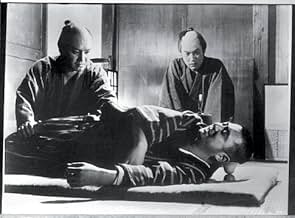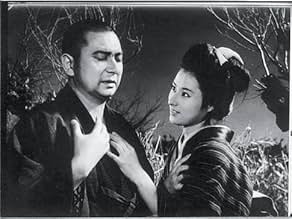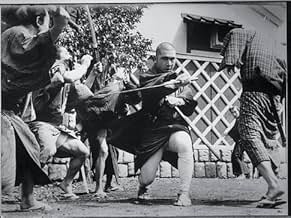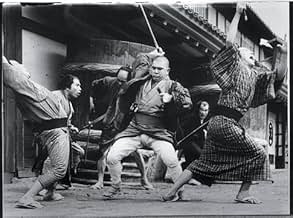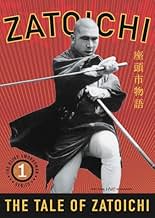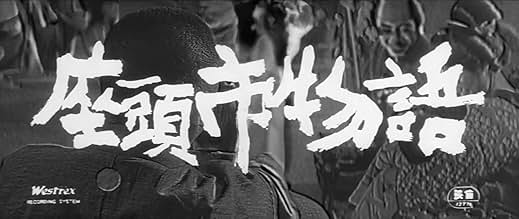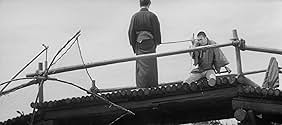Aggiungi una trama nella tua linguaThe adventures of a blind, gambling masseur who also happens to be a master swordsman.The adventures of a blind, gambling masseur who also happens to be a master swordsman.The adventures of a blind, gambling masseur who also happens to be a master swordsman.
- Regia
- Sceneggiatura
- Star
- Premi
- 1 candidatura in totale
- Masakichi
- (as Toshirô Chiba)
- Yahei
- (as Yoshito Yamaji)
Recensioni in evidenza
The reasons why the Zatôichi franchise enjoys such an enormous cult-status are numerous, but I will stick to the most important ones. The eponymous hero, Zatôichi must be the most likable character ever in cinema to work as a hired sword. Zatôichi, a blind masseur, has obtained his sword skills because he was tired of being looked down upon by others, as usual for blind people in Feudal Japan. Due to his excellent sword-skills, he makes a good living as a hired swordsman. His senses of smell and hearing are as excellent as his swordsmanship, which makes him one of the most powerful swordsmen. Even so, Zatôichi is a kind, gentle and humorous man by nature, who will rather solve problems otherwise than having to kill someone. Shintaro Katsu is brilliant in the role of his life, and I cannot imagine for anyone else to fit the role like Katsu did. Cult-filmmaker Takeshi Kitano (of whom I am a great fan) took a new turn on the role in 2003 - Katsu had passed away in 1997 - and did so greatly. Yet, to me, the only true Zatoichi will always be Shintaro Katsu. This first film in the series is one of only two that were filmed in black and white, and it already epitomizes what makes the brilliance of the series. "Zatôichi Monogatari" mixes Smurai Action with Comedy, Drama and philosophical elements. The film begins with the crafty Zatôichi, who tricks a bunch of fellow gamblers into underestimating him... The film marks the beginning to a great and highly successful series that may not be missed by any lover of Japanese cinema. I had seen several other "Zatôichi" films with Katsu, as well as the 2003 film with (and by) Kitano before seeing this one. The action is great in this first film, but it is the plot that outweighs the fighting by far. Overall, "Zatôichi Monogatari" is a fantastic piece of cult-cinema and everybody even remotely interested in Japanese films must see it.
There are several elements that make this movie so outstanding. First of all, the film's authentic settings bring the culture and history of rural Japan to life in a very authentic way. Secondly, the protagonist convinces as a man who relies on his moral compass and cleverness first and foremost and only draws a sword if he doesn't have any other choice. Thirdly, the numerous side characters are quite interesting as well, especially Zatoichi's wise opponent Hirate, the ruthless criminal Tate and his proud but desperate sister Otane who ends up falling in love with Zatoichi. Fourthly, the dialogues are really to the point and add something to characters and plot unlike many contemporary martial arts flicks. Fifthly, the few fight sequences in the movie are carefully choreographed and would go on to inspire any other genre film that would follow this movie.
By today's standards, The Tale of Zatoichi might not be the most vivid genre film but it's crafted in an artistic, detailed and intellectual manner that still stands out far over five decades after its initial release. Any martial arts fan should give this movie a chance. I would highly recommend the stunning Criterion Collection of the Zatoichi movies that truly offers value for money. Movies of this quality are rarely made nowadays and should be hold in high regard.
Too bad the camera works don't quite follow up. The scope is 70mm (or close to it), but I could settle with less if the cameraman (I suspect they didn't have one) didn't cut off the heads all the time. The use of zoom-lens sometimes works and sometimes don't. One time zooming in on Tane-san for instance was very dramatic. Intense was also the battle scenes. Very good.
Zatoichi is a good character and the actor playing him is fitting. The story is good and makes for an intriguing film despite some flaws. In all respects I think its inferior to Sanjuro though.
This is my first Zatoichi and I will check out other entries in the series for sure (at least the Kitano "Zatoichi" from 2003 is easy to get hold on).
In this first episode of a series that covered two decades, Ichi is hired by a gang leader to defeat a consumptive samurai who's been imported by a rival gang. The two swordsmen meet while fishing and become friends, but destiny has decreed they must fight each other, and only one will survive
Fans of action movies may be disappointed with ZATOICHI MONOGATARI, because there's virtually no fighting for the movie's first hour. Instead, there's unusual emphasis on character development. Ichi himself receives much of the attention, and Shintaro Katsu (who also played the role in all the sequels) presents us with a subtle, complex portrayal of the reluctant mercenary. His scenes with the enamored sister of one of the gang members and with the mortally sick samurai are played with great sincerity without becoming sentimental. These two characters are also sensitively portrayed. Even many of the crooks are carefully established as individuals.
The climax won't disappoint action fans, though. Beginning with a flurry of gang skirmishes, frenetically edited to a throbbing score, it ends on a bitter and almost tragic note after the inevitable confrontation between the two protagonists.
Director Kenji Misumi embellishes the slow build-up with a succession of captivating black-and-white compositions and attention to period detail. A degree of pace is maintained by making scene transitions with cuts rather than dissolves. Sets are given visual depth by being framed with foreground objects. The camera is often positioned slightly above or below the characters' eye-lines. Very precise interior lighting creates interesting patterns on and around the actors. By contrast, the daytime exteriors are overly bright and tend to disrupt the mood.
Far from being a typical samurai movie, ZATOICHI MONOGATARI is an unusually somber yet effective period drama, and probably the best entry in the long series it inaugurated.
Lo sapevi?
- QuizHanji's wife Yoshi practices "ohaguro" (literally: "black teeth"). In many areas of Asia, blackened teeth were considered a sign of beauty and maturity. In Japan, the practice was banned by the government in 1870.
- BlooperIn the moonlit scene by the pond, Tane tells Zatoichi that she has a facial mole exactly like his. But neither character has any such mole.
- Citazioni
Tane: You have a mole here. I wonder if it's a lucky mole. I have one just like it. They say it means I'll have lots of children.
Zatôichi: It's a lucky mole.
Tane: What would I do with so many children.
Zatôichi: Just don't raise them to be yakuza.
Tane: I won't. But why do you say that?
Zatôichi: Because to be a yakuza is a foolish way to live.
Tane: Then why don't you live a decent life?
Zatôichi: It's like being stuck in a bog. It's not easy to pull yourself out once you've fallen in.
- ConnessioniFeatured in Best in Action: 1961 (2018)
I più visti
Dettagli
- Data di uscita
- Paese di origine
- Lingua
- Celebre anche come
- The Tale of Zatoichi
- Azienda produttrice
- Vedi altri crediti dell’azienda su IMDbPro
- Tempo di esecuzione
- 1h 36min(96 min)
- Colore
- Mix di suoni
- Proporzioni
- 2.35 : 1

